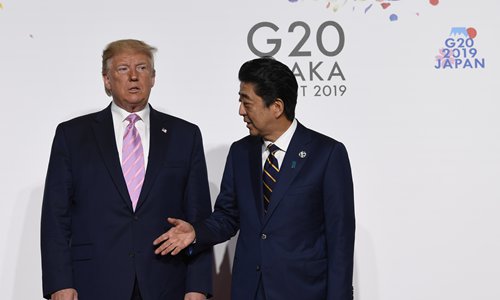HOME >> OPINION
Trump’s rant against Japan treaty may be a ripple, but will prompt security rethink
By Chen Yang Source:Global Times Published: 2019/7/3 18:28:42

Photo: IC
US President Donald Trump gave vent to his dissatisfaction with the Treaty of Mutual Cooperation and Security between the US and Japan at a press conference after the G20 summit on June 29 - "Look, if somebody attacks Japan, we go after them and we are in a battle - full force in effect… If somebody should attack the United States, they don't have to do that. That's unfair."
But he added he was not thinking of withdrawing from the pact, which may bring solace to Japanese minds.
The defense pact has been the cornerstone of the postwar Japan-US alliance. Once Washington withdraws from the treaty, it will not only affect Japan's diplomacy and Tokyo-Washington ties, but also the geopolitics of the entire Asia-Pacific region.
The treaty was originally aimed at bringing stability to Japan more than looking after its security. In 1951, Japan's then prime minister Shigeru Yoshida signed the treaty under which the US would still have rights to keep troops in Japan even after the Asian country regained its sovereignty.
The greatest significance of this treaty was to change the status of US military from an occupying force to a legitimate one. However, no US obligations to protect Japan were stipulated, which paved the way for subsequent revision of the treaty.
In 1960, in spite of much opposition at home, the Nobusuke Kishi administration pushed forward the revised security treaty, which clearly mentioned the US responsibility to protect Japan. The old treaty laid the initial foundation for Japan-US relations, and the revised one has served as the cornerstone of ties since the postwar period and has set the tone of postwar Japanese diplomacy - US dominance of Japan. What Trump is now complaining about is precisely the revised treaty.
Although Japan has benefited a lot from the treaty since the war ended, the country never fully accepted it.
Japan emerged rapidly from defeat, rising as the world's second-largest economy in 1968 and kept the position for 42 years. It was due to US military protection that Japan was able to concentrate on economic development, reduce conflicts with other countries, and build an image of a peaceful power.
The treaty has emboldened Japan in its approach to foreign affairs. In 2012, Washington sent a clear message that the treaty should apply to the Diaoyu Islands. It was the treaty that gave Japan the courage to challenge China on the islands and the South China Sea issue in recent years.
However, the security treaty has also shackled Japan's military development, drawing concern within the country. According to the US Congressional Research Service, about 54,000 US military personnel are stationed at 85 Japanese facilities. The deployment is aimed at providing security protection to Japan while preventing the revival of Japan's militarism. The treaty, to some extent, has been used to keep Japan under check.
As US power waned, Washington started asking Japan to wield more responsibility in maintaining regional and global peace. For instance, after Prime Minister Shinzo Abe started his second term in 2012, Japan decided to exercise its right to collective self-defense, relax the Arms Export Ban, and purchase a large quantity of US military weapons.
But the East Asian country is still unable to freely develop armaments due to restrictions posed by the treaty.
Therefore, Trump's tirade against the treaty may not make Abe worry, instead raising hopes that US withdrawal from the pact would unshackle Japan from the restraints of Washington's oversight and grant it more military autonomy.
It is also noteworthy that Trump scoffed at the treaty in the wake of Abe's attempts to amend the Japanese constitution. Amending Japan's constitution has been Abe's long-cherished political dream. Since his second term, he has hyped up the so-called North Korea threat theory and China threat theory in a bid to gain support for the move.
Nonetheless, with easing tensions on the Korean Peninsula and the warming of China-Japan relations, opinion in favor of Abe's wish has been found lacking. After all, what is the necessity of a constitutional amendment when the surrounding environment is not volatile?
Hence, Trump's complaints about the treaty have likely provided the Abe administration a new card. That is, Japan's security depends on the Japanese rather than the US. But it remains to be seen how the card will affect Japanese public opinion.
Trump's claim is only a ripple that can hardly shake the foundation of the Japan-US alliance. But this ripple will certainly prompt Japan to seriously consider measures it deems necessary to safeguard its security. Japan-US relations will last for a long time, but the security treaty may still be tweaked.
The author is an editor at the Global Times and a Japan watcher. opinion@globaltimes.com.cn
RELATED ARTICLES:
Posted in: ASIAN REVIEW